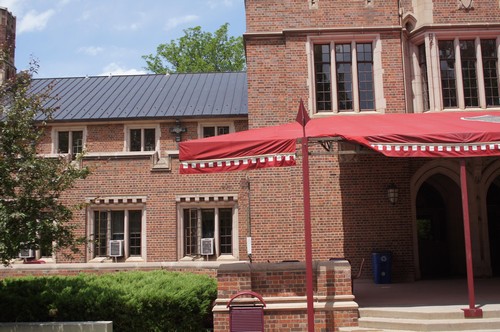 Photo by: Ryan Lumpkin
Photo by: Ryan Lumpkin
Nearly 30 graduate students from psychology and the international humanitarian relief programs participated in a nine-hour simulation of a humanitarian disaster in closed-off areas of campus Sunday.
The simulation involved 22 graduate psychology students in the International Disaster Psychology Program and seven graduate students from the Humanitarian Certificate Program at the Josef Korbel School of International Studies, and was intended to help students learn how to handle themselves as aide workers in times of disaster.
The event was the largest humanitarian crisis simulation to be held on campus. It was held atB the Ammi HydeB building and at Ben Cherrington Hall
Participating students were divided into teams of humanitarian aidB workers sent to help refugees affected by a confllict in Africa. Undergraduate students from Korbel played the parts of the refugees.
Participants were assigned teams on Friday. On Saturday, they met to discuss strategies for aiding the refugees by identifying and assessing their needs.
Team members had to convince a panel of donors to fund their proposed plan of humanitarian relief.
According to Courtney Mitchell, a psychology professor, the simulation evaluates the students’ ability to utilize specific tools to conduct a needs assessment and design a project addressing protection, gender-based violence and psychosocial and mental health concerns.
“[Students must] communicate effectively, function effectively as a member of a team, manage stress, tolerate ambiguity and manage time constraints,” said Mitchell. “These are the types of skills they will need to be effective in international humanitarian disasters.”
According to Mitchell, disaster situations are becoming increasingly common.
She said it is important for graduate students training to deal with these situations to have an idea of what to expect.
Students did not receive a grade for their work, however, they were evaluated by a board made up of 11 faculty and community members, in addition to their own self-assessment.
The evaluation will help determine what skills the students need to develop more.
This is the first simulation to involve graduate students from the two programs.
Mitchell said simulations are becoming more and more common in humanitarian training programs. She said she hopes to eventually integrate simulations into the curriculum for the MAIDP program, so participation would contribute to a grade.
Both the MAIDP program and the Humanitarian Certificate Program provided $2,500 for the simulation, and a grant for $2,000 from DU’s Office of Internationalization paid for the rest, for a totalB cost of $4,500.
Mitchell said this simulation was a lead-up to a bigger, full-scale event to take place next year where students will again simulate a disaster experience and how to handle it as aide workers.
The exact date of the upcoming simulation has not been determined, but it would likely involve all the students in the MAIDP program.
“A full simulation would be more complex,” said Mitchell. “It would ideally last over night and probably take place off-campus.”











